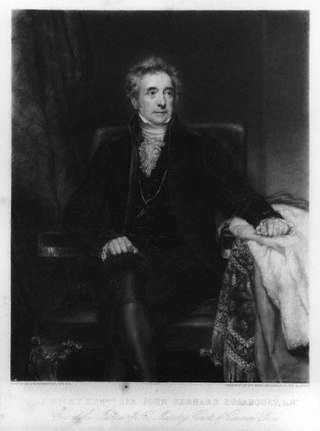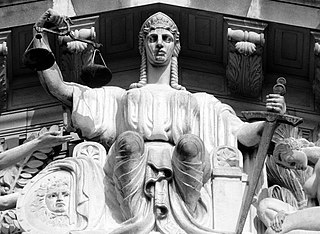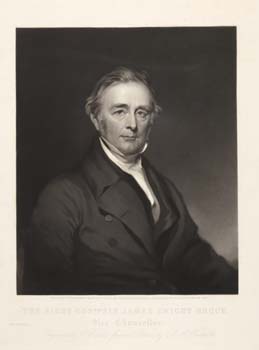Related Research Articles

Whilst the House of Lords of the United Kingdom is the upper chamber of Parliament and has government ministers, for many centuries it had a judicial function. It functioned as a court of first instance for the trials of peers and for impeachments, and as a court of last resort in the United Kingdom and prior, the Kingdom of Great Britain and the Kingdom of England.

The Court of Appeal is the highest court within the Senior Courts of England and Wales, and second in the legal system of England and Wales only to the Supreme Court of the United Kingdom. The Court of Appeal was created in 1875, and today comprises 39 Lord Justices of Appeal and Lady Justices of Appeal.

The Lord Chancellor, formally titled Lord High Chancellor of Great Britain, is a senior minister of the Crown within the Government of the United Kingdom. The lord chancellor is the minister of justice for England and Wales and the highest-ranking Great Officer of State in Scotland and England, nominally outranking the prime minister. The lord chancellor is appointed and dismissed by the sovereign on the advice of the prime minister. Prior to the union of England and Scotland into the Kingdom of Great Britain, there were separate lord chancellors for the Kingdom of England and the Kingdom of Scotland. Likewise, the Lordship of Ireland and its successor states maintained the office of lord chancellor of Ireland until the establishment of the Irish Free State in 1922, whereupon the office was abolished.

Douglas McGarel Hogg, 1st Viscount Hailsham, was a British lawyer and Conservative politician who twice served as Lord Chancellor, in addition to a number of other Cabinet positions. Mooted as a possible successor to Stanley Baldwin as party leader for a time in the very early 1930s, he was widely considered to be one of the leading Conservative politicians of his generation.

Charles Christopher Pepys, 1st Earl of Cottenham, was an English lawyer, judge and politician. He was twice Lord High Chancellor of Great Britain.

Charles Pratt, 1st Earl Camden, PC was an English lawyer, judge and Whig politician who was first to hold the title of Earl Camden. As a lawyer and judge he was a leading proponent of civil liberties, championing the rights of the jury, and limiting the powers of the State in leading cases such as Entick v Carrington.

Edward Burtenshaw Sugden, 1st Baron Saint Leonards, was a British lawyer, judge and Conservative politician.

In English law, natural justice is technical terminology for the rule against bias and the right to a fair hearing. While the term natural justice is often retained as a general concept, it has largely been replaced and extended by the general "duty to act fairly".
Donaldson v Becket (1774) 2 Brown's Parl. Cases 129, 1 Eng. Rep. 837; 4 Burr. 2408, 98 Eng. Rep. 257; 17 Cobbett's Parl. Hist. 953 is the ruling by the British House of Lords that held that copyright in published works was not perpetual but was subject to statutory limits. Some scholars disagree on the reasoning behind the decision.

The Supreme Court of the United Kingdom is the final court of appeal in the United Kingdom for all civil cases, and for criminal cases originating in England, Wales and Northern Ireland. As the United Kingdom's highest appellate court for these matters, it hears cases of the greatest public or constitutional importance affecting the whole population.
"Ramsay principle" is the shorthand name given to the decision of the House of Lords in two important cases in the field of UK tax, reported in 1982:

Sir John Pratt (1657–1725) was an English judge and politician. He was Lord Chief Justice of England from 15 May 1718 until 2 March 1725. He was appointed as an interim Chancellor of the Exchequer on 2 February 1721 until 3 April 1721.

Saunders v Vautier[1841] EWHC J82, (1841) 4 Beav 115 is a leading English trusts law case. It laid down the rule of equity which provides that, if all of the beneficiaries in the trust are of adult age and under no disability, the beneficiaries may require the trustee to transfer the legal estate to them and thereby terminate the trust. The rule has been repeatedly affirmed in common law jurisdictions, and is commonly referred to as "the rule in Saunders v Vautier" for shorthand.

Reynolds v Times Newspapers Ltd was a House of Lords case in English defamation law concerning qualified privilege for publication of defamatory statements in the public interest. The case provided the Reynolds defence, which could be raised where it was clear that the journalist had a duty to publish an allegation even if it turned out to be wrong.

United Kingdom administrative law is part of UK constitutional law that is designed through judicial review to hold executive power and public bodies accountable under the law. A person can apply to the High Court to challenge a public body's decision if they have a "sufficient interest", within three months of the grounds of the cause of action becoming known. By contrast, claims against public bodies in tort or contract are usually limited by the Limitation Act 1980 to a period of 6 years.

Sir John Bernard Bosanquet KS PC was a British judge.

Bias is one of the grounds of judicial review in Singapore administrative law which a person can rely upon to challenge the judgment of a court or tribunal, or a public authority's action or decision. There are three forms of bias, namely, actual, imputed and apparent bias.
Charles Purton Cooper QC, FRS (1793–1873) was an English lawyer and antiquary.

Sir James Lewis Knight-Bruce, was an English barrister, judge and politician.

Foley v Hill (1848) 2 HLC 28, 9 ER 1002 is a judicial decision of the House of Lords in relation to the fundamental nature of a bank account. Together with Joachimson v Swiss Bank Corporation [1921] 3 KB 110 it forms part of the foundational cases relating to English banking law and the nature of a bank's relationship with its customer in relation to the account.
References
- "Cases - judges". Sixth Form Law. Archived from the original on 8 March 2017.
{{cite web}}: CS1 maint: unfit URL (link) - Pdf document regarding a speech by Lord Cambell in the house of lords and certain facts regarding the House of Lords case.